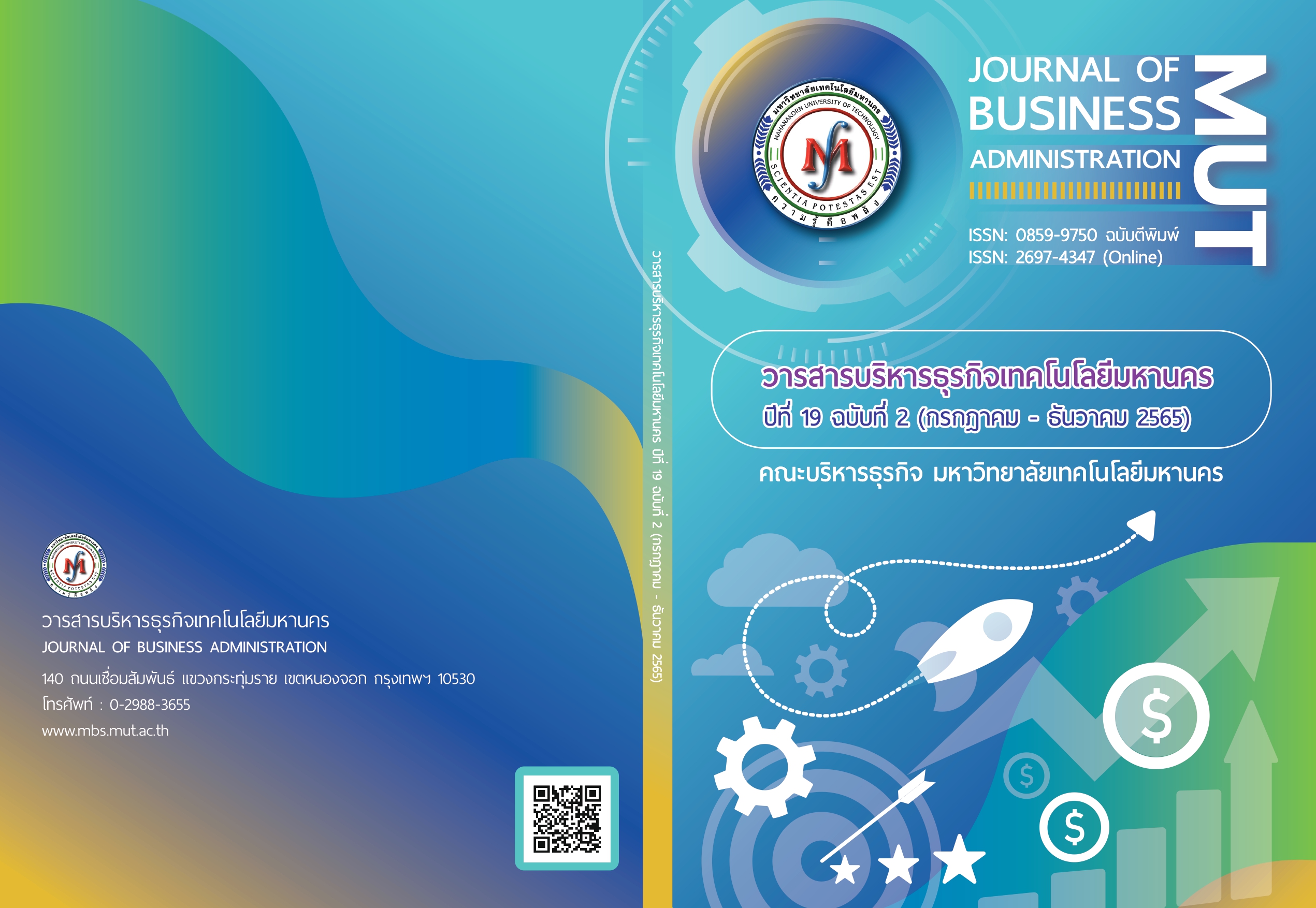Factors affecting Willingness to Pay for Copayment in Social Security System of Insurer under Section 33 in Bangkok
Keywords:
willingness to pay, copayment, social security, insurer under section 33Abstract
The research on factors affecting willingness to pay for copayment in Social Security System of insured people under Section 33 in Bangkok aims to study factors that affected willingness to pay in the joint insurance of the insured people under Section 33 in order to receive similar benefits to the universal health insurance system. The data were collected from the questionnaires for clients who had social security rights under Section 33 in two public hospitals in Bangkok, consisting of 400 samples. The ordered logistic regression was applied.
The results of the ordered logistic regression analysis showed that satisfaction with physical condition, overall quality of service of personnel and the quality of treatment for specific illnesses positively affected the level of willingness to pay with statistical significance at the level of 0.05 while receiving information about social security, doctor's treatment quality and the pursuit of knowledge in care and control of illness negatively affected the level of willingness to pay at a statistically significant level of 0.05.
The value of willingness to pay for the joint insurance of the insured people was approximately 950.50 baht per person/month. The result of the structural equation model (SEM) concluded that perception of various information about social security, satisfaction with the insured people's physical condition and service quality of hospitals (including physicians, specific treatment, and overall service quality) had a positive effect on the co-insured willingness to pay at a statistically significant level of 0.01.
Therefore, the government should improve the public relations for social security activities to help insured people realize the additional benefits. Also, they should provide proactive social security services and improve service quality.
References
Ahlheim, M. and Buchholz, W. 1999. WTP or WTA-Is that the Question? Reflections on the Difference between “Willingness To Pay” and “Willingness to Accept”. Retrieved January 20, 2021 from https://www.semanticscholar.org/paper/WTP-or-WTA-Is-that-the-Question-Reflections-on-the-Buchholzb/0915507475f07500154b3325c40dc0bed59d9815
Al-Hanawi, M. K. et al. 2018. Investigating the Willingness to Pay for a Contributory National Health Insurance Scheme in Saudi Arabia: A Cross-sectional Stated Preference Approach. Appl Health Econ Health Policy. 16 (2): 259 - 271. Retrieved January 1, 2021 from https://www.ncbi.nlm.nih.gov/pubmed/29307076
Azhar, A. et al. 2018. Willingness to Pay For Health Insurance in Sarawak, Malaysia: A Contingent Valuation Method. Retrieved January 5, 2021 from https://www.researchgate.net/publication/323968171_Willingness_to_Pay_For_Health_Insurance_in_Sarawak_Malaysia_A_Contingent_Valuation_Method
Berman, S. and Giardino, P. 2018. Understanding Cost Sharing: Deductibles, Copayments & Coinsurance. Retrieved January 7, 2021 from https://www.healthychildren.org/English/family-life/health-management/health-insurance/Pages/Understanding-Cost-Sharing-Deductibles-Copayments-Coinsurance.aspx
Bosompra, K. et al. 2001. Psychosocial factors associated with the public's willingness to pay for genetic testing for cancer risk: a structural equations model. Retrieved January 9, 2021 from https://www.researchgate.net/publication/11979915_Psychosocial_factors_associated_with_the_public's_willingness_to_pay_for_genetic_testing_for_cancer_risk_a_structural_equations_model
Carlssona, F and Martinsson, P. 2003. Design techniques for stated preference methods in health economics. Health Economics. 12: 281 – 294. Retrieved January 11, 2021 from https://doi.org/10.1002/hec.729
Cornell University. 2008. Fit Statistics commonly reported for CFA and SEM. Retrieved January 13, 2021 from https://www.hrstud.unizg.hr/_download/repository/SEM_fit.pdf
Davis, E. 2019. An Overview of Health Insurance Cost-Sharing. Retrieved January 5, 2021 from https://www.verywellhealth.com/what-is-cost-sharing-1738709
Esan, O. 2016. Price elasticity of demand for psychiatric consultation in a Nigerian psychiatric service. Retrieved January 8, 2021 from https://www.ncbi.nlm.nih.gov/pmc/articles/PMC5398448/
European Hospital and Healthcare Federation. 2015. Out-of-pocket Payment in healthcare systems in the European Union. Retrieved January 20, 2021 from http://www.hope.be/wp-content/uploads/2015/11/99_2015_HOPE-REPORT_Out-of-pocket-payments-in-healthcare-systems-in-the-European-Union.pdf
Harris, J. M. and Roach, B. 2018. Environmental and Natural Resource Economics A Contemporary Approach. 4th ed. Routledge, New York.
Hong, Y. et al. 2017. Multigroup Path Analysis of the Influence of Healthcare Quality, by Different Health Insurance Types. Journal of Healthcare Management. 62 (2): 93 – 105, MAR 2017. Retrieved January 1, 2021 from 10.1097/JHM-D-17-00008
Kanchanaburi Provincial Social Security Office. 2020. Privileges of the insured will receive according to the Social Security Act (No. 4) B.E. 2558. Retrieved January 19, 2021 from http://www.sso.go.th/wprp/kanchanaburi/content.jsp?id=10379&cat=1655
&lang=en
Ministry of Labor. 2020. Social Security Act, B.E. 2533. Retrieved January 1, 2021 from https://lb.mol.go.th/%E0%B8%9E%E0%B8%A3%E0%B8%9A- %E0%B8%9B%E0%B8%A3%E0%B8%B0%E0%B8%81%E0%B8%B1%E0%B8%99%E0%B8%AA%E0%B8%B1%E0 %B8%87%E0%B8%84%E0%B8%A1-2533
Muansrichai, S. 2018. Social security rights Benefits that workers should know and must receive. Retrieved January 22, 2021 from https://flowaccount.com/blog/%E0%B8%AA%E0%B8%B4%E0%B8%97%E0%B8%98%E0%B8%B4%E0%B8%9B%E0%B8%A3%E0%B8%B0%E0%B8%81%E0%B8%B1%E0%B8%99%E0%B8%AA%E0%B8%B1%E0%B8%87%E0%B8%84%E0%B8%A1/#i-2
Nosratnejad, S. et al. 2016. Systematic Review of Willingness to Pay for Health Insurance in Low and Middle Income Countries. Retrieved January 24, 2021 from https://journals.plos.org/plosone/article/file?id=10.1371/journal.pone.0157470&type=printable.
Ogasawara, K and Abe, T. 2013. WTP (willingness to pay) for tele-health consultation service in Hokkaido, Japan. Stud Health Technol Inform. 2013; 192:1026. Retrieved January 25, 2021 from http://ebooks.iospress.nl/publication/34242
Schermelleh-Engel, K. and Moosbrugger, H. 2003. Evaluating the Fit of Structural Equation Models: Tests of Significance and Descriptive Goodness-of-Fit Measures. Retrieved January 2, 2021 from https://www.researchgate.net/publication/251060246_Evaluating_the_Fit_of_Structural_Equation_Models_Tests_of_Significance_and_Descriptive_Goodness-of-Fit_Measures
Shiroiwa, T. et al. 2010. International Survey on Willingness-to-Pay (WTP) for one Additional Qaly Gained: What is the threshold of cost effectiveness?. Health Economics. 19: 422 – 437. Retrieved January 22, 2021 from https://doi.org/10.1002/hec.1481
Siam Commercial Bank. 2019. Differences in benefits (Social Security - Gold Card). Retrieved January 29, 2021 from: https://www.scb.co.th/th/personal-banking/stories/how-to-choose-social-security-gold-card-and-health-insurance.html
Social Security Office. 2020. Social Security Fund Statistics. Retrieved January 24, 2021 from https://www.sso.go.th/wpr/main/knowledge/social security fund statistics_category_list-label_1_168_0
Vorlapanit, N. and Kidsom, A. 2019. Willingness to pay for co-payment in the universal health insurance system. Department of Economics Faculty of Economics Kasetsart University.
Downloads
Published
Issue
Section
License

This work is licensed under a Creative Commons Attribution-NonCommercial-NoDerivatives 4.0 International License.
ข้อความ ข้อคิดเห็น ข้อมูล เนื้อหา รูปภาพ แผนภูมิ แผนผัง เป็นต้น ที่ปรากฏและแสดงในบทความต่างๆ ในวารสารบริหารธุรกิจเทคโนโลยีมหานคร ถือเป็นความรับผิดชอบโดยตรงของผู้เขียนบทความนั้นๆ มิใช่เป็นความรับผิดชอบใดๆ ของวารสารบริหารธุรกิจเทคโนโลยีมหานคร และมหาวิทยาลัยเทคโนโลยีมหานคร
บทความที่ตีพิมพ์ในวารสารบริหารธุรกิจเทคโนโลยีมหานคร ถือเป็นลิขสิทธิ์เฉพาะของคณะบริหารธุรกิจ มหาวิทยาลัยเทคโนโลยีมหานคร หากบุคคลหรือหน่วยงานใดต้องการนำทั้งหมดหรือส่วนใดส่วนหนึ่งไปเผยแพร่ต่อหรือเพื่อกระทำการใดๆ จะต้องได้รับการอนุญาตเป็นลายลักษณ์อักษรจากคณะบริหารธุรกิจ มหาวิทยาลัยเทคโนโลยีมหานครก่อนเท่านั้น



